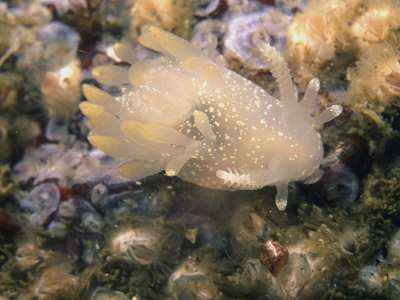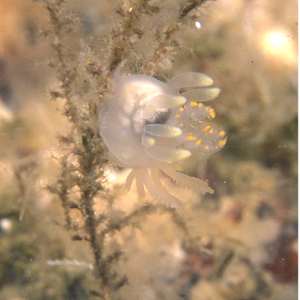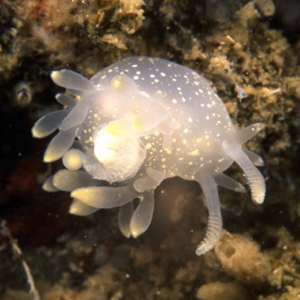Ancula pacifica from Vancouver, Canada
June 13, 2005
From: Paul Sim

Here are a couple more shots of our version of this beautiful creature. They were very numerous on this particular wall at this particular time of the year. Later, we won't see them at all. Where do they go?
Locality: Woodlands Wharf, Indian Arm, Burrard Inlet, Vancouver, BC, Canada. Pacific. Depth: 50 feet. Length: 3/8 inch. May 11, 2005. Wall dive. Photographer: Paul Sim
Paul Sim
plsim@shaw.ca


Dear Paul,
Thanks for these photos of 'Ancula pacifica'. Firstly I find it very difficult to believe the spotted and yellow-lined animals are really both the same species, and also that either of them are the same as the Atlantic A. gibbosa. Although I have put all these colour forms together on the one Fact Sheet, I suspect some anatomical work might show suggest they should be splits.
Concerning where do they go when you can't find them. Most small nudibranchs live for less than a year, and most have planktonic larvae which swim or drift around in the water for part of their life cycle. If the species is particularly seasonal, absence could mean it is in its larval stage. Since larvae are at the mercy of currents etc, there is no guarantee that a particular species will be found at a particular spot each year. For short lived species - living less than a year - we think the species moves around from place to place by the adults producing larvae at one place, which then drift to another place where they find the right food, settle and grow to adulthood. These adults then produce larvae which float away and the cycle begins again. For species such as the one you describe here which seem present each year at the same spot, its possible the larvae are dependent on a cycle of temperature and currents which combine to bring back the right conditions each year for the species to thrive. Usually these 'regular returns' are not as clockwork as they appear, but diligent sampling and recording of species is very time-consuming and for that reason is seldom undertaken. Longterm regular recording is the sort of thing dive clubs around the world sometimes undertake, but it takes a great degree of committment by the participants and has to be done for some years.
Best wishes,
Bill Rudman
Related messages
-
Ancula gibbosa from California
From: Clinton Bauder, May 31, 2007 -
Re: Ancula from NE Pacific
From: Jan Kocian, June 3, 2006 -
Re: more Ancula from NE Pacific
From: Jan Kocian, June 1, 2006 -
Ancula from NE Pacific
From: William Hevener, May 29, 2006 -
Spotted Ancula from eastern Russia
From: Alexei Chernyshev, January 13, 2006 -
Ancula pacifica from South Korea
From: Dong Bum Koh, July 16, 2005 -
Spotted Ancula from NE Pacific
From: Sandra Millen, July 11, 2005 -
Re: Supplement to Pacific Coast Nudibranchs
From: Joao Pedro T. L. S. Silva, July 23, 2004 -
Ancula gibbosa from Massachusetts, USA
From: Alan Shepard, January 13, 2003 -
Ancula gibbosa from New England
From: Alan Shepard, March 20, 2002 -
Colour variation in Ancula gibbosa
From: Bernard Picton , March 6, 2001 -
Re: Ancula pacifica feeding photos
From: Jeff Goddard, June 29, 2000 -
Ancula pacifica feeding
From: Bruce Wight, June 28, 2000 -
Ancula pacifica mating
From: Bruce Wight, June 20, 2000 -
Ancula pacifica in Oregon and Washington
From: Jeff Goddard, June 12, 2000 -
A photo of 'typical' Ancula pacifica
From: Dave Behrens, June 11, 2000 -
Photos from British Columbia
From: Marli Wakeling, June 3, 2000 -
Ancula gibbosa white-spotted version
From: Marli Wakeling, May 28, 2000 -
Ancula gibbosa colour variety
From: Sandra Millen, May 19, 2000 -
Differences between species of Ancula
From: Sylvain LE BRIS , March 26, 2000
